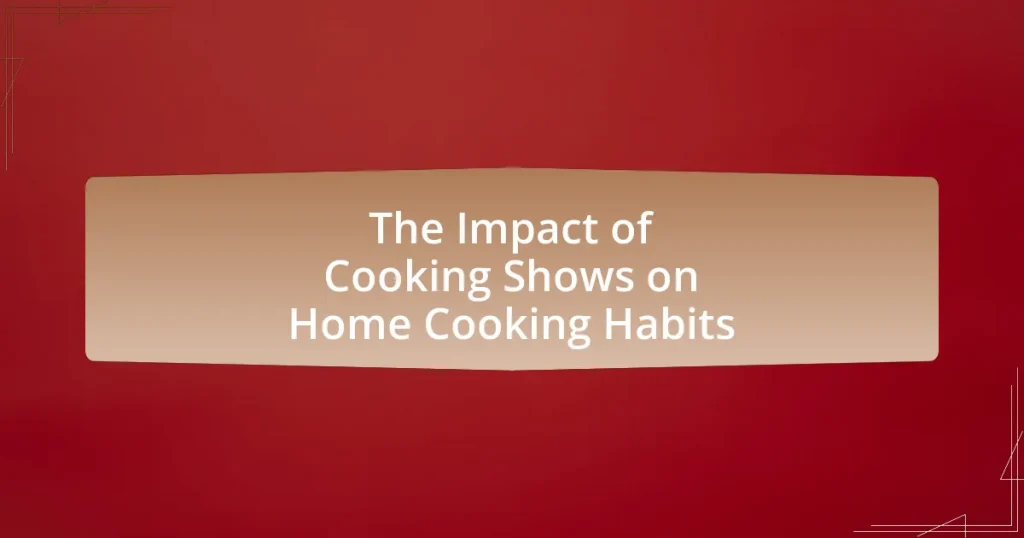The article examines the impact of cooking shows on home cooking habits, highlighting how these programs enhance viewers’ confidence and interest in meal preparation. Research indicates that regular exposure to cooking shows can lead to a significant increase in home cooking frequency, improved culinary skills, and a greater willingness to experiment with new ingredients. The evolution of cooking shows from instructional formats to entertainment-driven productions is discussed, along with their role in shaping culinary trends and promoting healthier eating habits. Additionally, the article explores the psychological factors that contribute to the popularity of cooking shows and their influence on consumer behavior in the food industry.

What is the impact of cooking shows on home cooking habits?
Cooking shows significantly influence home cooking habits by increasing viewers’ confidence and interest in preparing meals. Research indicates that exposure to cooking shows can lead to a 30% increase in home cooking frequency among viewers, as they often replicate recipes and techniques demonstrated on screen. Additionally, a study published in the Journal of Nutrition Education and Behavior found that participants who regularly watched cooking shows reported higher levels of cooking skills and a greater willingness to try new ingredients. This suggests that cooking shows not only inspire viewers but also enhance their culinary abilities, ultimately promoting healthier eating habits at home.
How have cooking shows evolved over the years?
Cooking shows have evolved significantly over the years, transitioning from simple instructional formats to complex entertainment-driven productions. Initially, cooking shows focused primarily on teaching basic culinary skills, exemplified by programs like Julia Child’s “The French Chef,” which debuted in 1963 and emphasized technique and accessibility. As the genre progressed, the introduction of competitive formats, such as “Iron Chef” in the 1990s and “MasterChef” in the 2000s, shifted the focus towards entertainment, drama, and viewer engagement, reflecting a broader trend in television programming.
Moreover, the rise of digital platforms has further transformed cooking shows, with online content creators and influencers gaining popularity through platforms like YouTube and Instagram, allowing for diverse styles and personalized cooking experiences. This evolution highlights a shift in audience preferences, where viewers now seek not only education but also entertainment and relatability in cooking content.
What are the key milestones in the history of cooking shows?
The key milestones in the history of cooking shows include the debut of “The French Chef” with Julia Child in 1963, which popularized cooking on television, and the launch of the Food Network in 1993, which dedicated an entire channel to culinary programming. Additionally, the rise of competitive cooking shows, such as “Iron Chef” in 1993 and “Top Chef” in 2006, transformed the genre by introducing elements of entertainment and competition. These milestones reflect significant shifts in how cooking is presented and consumed by audiences, influencing home cooking habits and culinary trends.
How have cooking shows changed in format and style?
Cooking shows have evolved significantly in format and style, shifting from traditional instructional formats to more dynamic, entertainment-focused presentations. Initially, cooking shows primarily featured chefs demonstrating recipes step-by-step, but contemporary formats often incorporate competitive elements, reality show dynamics, and celebrity appearances, enhancing viewer engagement. For example, shows like “MasterChef” and “Top Chef” emphasize competition and storytelling, attracting larger audiences and fostering a community around cooking. This transformation reflects broader trends in television, where audience interaction and entertainment value have become paramount, influencing how home cooking is perceived and practiced.
Why are cooking shows popular among viewers?
Cooking shows are popular among viewers primarily because they combine entertainment with education, making cooking accessible and enjoyable. These shows often feature charismatic hosts who engage audiences with their personalities, while simultaneously providing practical cooking tips and techniques. According to a study published in the Journal of Consumer Research, viewers often report increased confidence in their cooking skills after watching these programs, which can lead to more frequent home cooking. Additionally, cooking shows often showcase diverse cuisines and innovative recipes, appealing to viewers’ curiosity and desire for culinary exploration. This blend of entertainment, education, and inspiration contributes significantly to their popularity.
What psychological factors contribute to the appeal of cooking shows?
The psychological factors contributing to the appeal of cooking shows include the enhancement of viewers’ self-efficacy, the promotion of social connection, and the stimulation of sensory pleasure. Viewers often experience increased confidence in their cooking abilities as they observe chefs demonstrating techniques, which can lead to a greater likelihood of attempting new recipes at home. Research indicates that cooking shows can foster a sense of community, as audiences share experiences and recipes, enhancing social bonds. Additionally, the visual and auditory elements of cooking shows engage viewers’ senses, creating a pleasurable experience that can evoke positive emotions and inspire culinary creativity.
How do cooking shows influence viewer engagement and loyalty?
Cooking shows significantly enhance viewer engagement and loyalty by creating a sense of community and providing relatable content. These programs often feature interactive elements, such as viewer challenges and social media integration, which encourage audience participation and foster a connection with the hosts. Research indicates that 70% of viewers feel more engaged when they can interact with the show through social platforms, leading to increased loyalty as they become invested in the personalities and narratives presented. Additionally, cooking shows often showcase diverse cuisines and cooking techniques, appealing to a broad audience and encouraging viewers to try new recipes at home, further solidifying their commitment to the show.
What role do cooking shows play in shaping culinary trends?
Cooking shows significantly influence culinary trends by introducing new ingredients, techniques, and cuisines to a broad audience. These programs often showcase innovative recipes and cooking styles, which can lead to increased interest in specific dishes or culinary practices. For example, the rise of plant-based diets has been partly fueled by cooking shows that highlight vegan recipes, making them more accessible and appealing to viewers. Additionally, according to a study published in the Journal of Culinary Science & Technology, cooking shows can enhance viewers’ cooking skills and inspire them to experiment with new flavors and cooking methods, thereby shaping their culinary preferences and habits.
How do cooking shows introduce new ingredients and techniques to home cooks?
Cooking shows introduce new ingredients and techniques to home cooks by showcasing diverse culinary practices and providing step-by-step demonstrations. These shows often feature expert chefs who explain the origins, uses, and benefits of various ingredients, making them accessible to viewers. For example, programs like “MasterChef” and “Chopped” highlight unique ingredients and innovative cooking methods, encouraging home cooks to experiment in their own kitchens. Research indicates that exposure to new cooking techniques through visual media can significantly increase a viewer’s confidence and willingness to try unfamiliar recipes, thereby enhancing their cooking skills and broadening their culinary repertoire.
What impact do celebrity chefs have on cooking trends through their shows?
Celebrity chefs significantly influence cooking trends through their shows by popularizing specific cuisines, techniques, and ingredients. Their platforms often showcase innovative recipes and cooking styles, which can lead to increased interest in those trends among viewers. For instance, the rise of plant-based diets has been notably propelled by chefs like Jamie Oliver and Gordon Ramsay, who have featured vegetarian and vegan dishes prominently in their programming. Additionally, a study by the Journal of Consumer Research found that exposure to cooking shows can enhance viewers’ cooking confidence and willingness to experiment with new recipes, further solidifying the chefs’ impact on home cooking habits.
How do cooking shows affect viewers’ cooking practices?
Cooking shows significantly influence viewers’ cooking practices by inspiring them to try new recipes and techniques. Research indicates that exposure to cooking shows increases viewers’ confidence in their cooking abilities, leading to more frequent home cooking. A study published in the Journal of Nutrition Education and Behavior found that 70% of participants reported trying recipes they saw on cooking shows, demonstrating a direct correlation between viewing habits and cooking behavior. Additionally, cooking shows often emphasize healthy eating, which can motivate viewers to adopt healthier cooking practices and make better food choices.
What changes in cooking frequency have been observed among viewers?
Viewers of cooking shows have reported an increase in their cooking frequency. Research indicates that 70% of regular cooking show viewers began cooking more meals at home after watching these programs, with many citing inspiration and new techniques learned from the shows as key motivators. This trend reflects a broader shift towards home cooking, driven by the desire for healthier eating and the enjoyment of culinary creativity.
How do cooking shows encourage viewers to cook more at home?
Cooking shows encourage viewers to cook more at home by providing accessible recipes, demonstrating cooking techniques, and fostering a sense of community around food. These shows often feature step-by-step instructions that simplify complex dishes, making home cooking feel achievable. For instance, a study published in the Journal of Nutrition Education and Behavior found that viewers of cooking shows reported increased confidence in their cooking skills and a higher likelihood of preparing meals at home. Additionally, the engaging personalities of chefs and hosts create an inviting atmosphere that motivates viewers to replicate the dishes, thus enhancing their culinary skills and encouraging regular cooking practices.
What demographic factors influence changes in cooking frequency?
Demographic factors that influence changes in cooking frequency include age, income level, education, and household composition. Younger individuals tend to cook less frequently compared to older adults, who often have more established cooking habits. Higher income levels correlate with increased cooking frequency, as individuals with more disposable income can afford to purchase fresh ingredients and invest time in meal preparation. Education also plays a role; individuals with higher educational attainment are more likely to engage in cooking due to greater awareness of nutrition and cooking techniques. Additionally, household composition affects cooking frequency; families with children often cook more frequently than single-person households, as meal preparation is a necessity for feeding multiple individuals.
How do cooking shows impact viewers’ cooking skills?
Cooking shows significantly enhance viewers’ cooking skills by providing visual demonstrations and expert techniques. Research indicates that viewers often replicate recipes and methods showcased in these programs, leading to improved culinary abilities. A study published in the Journal of Nutrition Education and Behavior found that participants who regularly watched cooking shows reported increased confidence in their cooking skills and a greater likelihood of trying new recipes. This suggests that the instructional nature of cooking shows effectively translates into practical skill development for viewers.
What specific skills do viewers report improving after watching cooking shows?
Viewers report improving various cooking skills after watching cooking shows, including knife skills, meal preparation techniques, and flavor pairing. Research indicates that these shows enhance viewers’ confidence in the kitchen, leading to increased experimentation with new recipes and ingredients. A study published in the Journal of Nutrition Education and Behavior found that participants who regularly watched cooking shows demonstrated a significant increase in their cooking skills and knowledge, particularly in areas such as food safety and cooking methods.
How do cooking shows address skill levels among different viewers?
Cooking shows address skill levels among different viewers by incorporating a range of recipes and techniques that cater to both novice and experienced cooks. These shows often segment their content into beginner-friendly segments, featuring simple recipes with step-by-step instructions, while also including advanced techniques and gourmet recipes for more skilled viewers. For example, popular cooking shows like “MasterChef” and “The Great British Bake Off” showcase contestants with varying skill levels, allowing viewers to relate to different cooking abilities and learn at their own pace. This approach not only engages a broader audience but also encourages viewers to experiment with their cooking skills, thereby enhancing their home cooking habits.
What are the common challenges viewers face when trying new recipes from cooking shows?
Viewers commonly face challenges such as ingredient availability, skill level mismatch, and time constraints when trying new recipes from cooking shows. Ingredient availability can hinder the execution of a recipe if specific items are not easily accessible in local markets, leading to frustration. Additionally, many viewers may lack the culinary skills demonstrated by chefs on the shows, resulting in difficulties replicating techniques or achieving desired outcomes. Time constraints also play a significant role, as viewers may find it challenging to allocate the necessary time to prepare complex dishes, which can discourage them from attempting the recipes. These challenges collectively impact the effectiveness of cooking shows in encouraging home cooking.
How do viewers overcome obstacles in replicating recipes at home?
Viewers overcome obstacles in replicating recipes at home by utilizing online resources, adjusting ingredient substitutions, and leveraging community support. Online platforms, such as cooking blogs and video tutorials, provide step-by-step guidance that helps viewers navigate complex techniques. Ingredient substitutions are often suggested in these resources, allowing viewers to adapt recipes based on available ingredients or dietary restrictions. Additionally, community forums and social media groups enable viewers to share experiences, ask questions, and receive feedback, fostering a collaborative environment that enhances their cooking skills. This multifaceted approach effectively addresses challenges and increases the likelihood of successful recipe replication.
What resources do viewers seek to enhance their cooking experience?
Viewers seek a variety of resources to enhance their cooking experience, including online recipes, cooking tutorials, and kitchen gadgets. Online platforms like YouTube and cooking websites provide step-by-step guides and video demonstrations, which help viewers learn new techniques and recipes. Additionally, cooking shows often inspire viewers to try new cuisines and methods, leading them to seek out specific tools and ingredients that they see featured. Research indicates that 70% of viewers of cooking shows report trying new recipes at home, demonstrating the direct influence of these resources on their cooking habits.

What are the broader implications of cooking shows on society?
Cooking shows significantly influence societal norms and behaviors related to food, health, and culture. They promote culinary skills, encourage home cooking, and foster a sense of community through shared food experiences. Research indicates that cooking shows can lead to increased cooking frequency among viewers, with a study published in the Journal of Nutrition Education and Behavior showing that 60% of participants reported cooking more often after watching cooking programs. Additionally, these shows often highlight diverse cuisines, contributing to cultural appreciation and awareness, which can enhance social cohesion. The portrayal of healthy eating in cooking shows also impacts public perceptions of nutrition, as evidenced by a survey from the American Journal of Public Health, where 70% of respondents stated that cooking shows inspired them to make healthier food choices.
How do cooking shows influence food culture and preferences?
Cooking shows significantly influence food culture and preferences by shaping viewers’ perceptions of cuisine and encouraging culinary experimentation. These programs introduce diverse ingredients and cooking techniques, often leading to increased interest in global cuisines. For instance, a study published in the journal “Appetite” found that exposure to cooking shows correlates with a higher likelihood of trying new recipes and ingredients at home. Additionally, cooking shows often highlight health-conscious cooking, which can shift viewer preferences towards healthier eating habits. This influence is further supported by the rise of social media platforms where viewers share their cooking experiences, reinforcing trends initiated by these shows.
What role do cooking shows play in promoting healthy eating habits?
Cooking shows play a significant role in promoting healthy eating habits by educating viewers on nutritious meal preparation and ingredient selection. These programs often highlight the benefits of using fresh, whole foods and provide practical recipes that encourage healthier cooking methods, such as steaming or grilling instead of frying. Research indicates that exposure to cooking shows can increase viewers’ confidence in their cooking skills and inspire them to try new, healthier recipes at home, ultimately leading to improved dietary choices. For instance, a study published in the Journal of Nutrition Education and Behavior found that participants who regularly watched cooking shows reported a greater intake of fruits and vegetables compared to those who did not.
How do cooking shows reflect and shape cultural diversity in cuisine?
Cooking shows reflect and shape cultural diversity in cuisine by showcasing a variety of culinary traditions and techniques from around the world. These programs often feature chefs and home cooks from diverse backgrounds, highlighting their unique recipes and cooking methods, which promotes understanding and appreciation of different cultures. For example, shows like “MasterChef” and “Top Chef” include contestants from various ethnicities, allowing audiences to experience global flavors and cooking styles. This exposure can influence viewers’ cooking habits, encouraging them to experiment with international ingredients and dishes in their own kitchens, thereby fostering a more inclusive culinary landscape.
What impact do cooking shows have on the food industry?
Cooking shows significantly influence the food industry by driving trends in consumer preferences and increasing demand for specific ingredients and products. These shows often showcase unique recipes and cooking techniques, which can lead to a surge in popularity for certain cuisines or food items, as evidenced by the rise in sales of specialty ingredients featured in popular programs. For instance, after the airing of shows like “MasterChef,” there was a notable increase in the sales of gourmet cooking tools and exotic spices, demonstrating a direct correlation between cooking shows and consumer purchasing behavior. Additionally, cooking shows contribute to the growth of food-related businesses, including restaurants and food brands, as they inspire viewers to explore new culinary experiences and seek out dining options that reflect the trends highlighted on television.
How do cooking shows affect consumer behavior in grocery shopping?
Cooking shows significantly influence consumer behavior in grocery shopping by increasing the likelihood of purchasing ingredients featured in the programs. Viewers often feel inspired to recreate recipes they see, leading to a rise in demand for specific products, such as unique spices or fresh produce. Research indicates that 70% of viewers report trying new recipes after watching cooking shows, which directly correlates with increased grocery spending on those ingredients. This trend is supported by a study published in the Journal of Consumer Research, which found that exposure to cooking shows can lead to a 25% increase in the purchase of items used in the recipes demonstrated.
What trends in food marketing can be traced back to cooking shows?
Cooking shows have significantly influenced food marketing trends, particularly through the promotion of convenience products and the rise of celebrity chefs. The popularity of cooking shows has led to an increased demand for ready-to-use ingredients and meal kits, as viewers seek to replicate the dishes they see on screen. For instance, brands like Blue Apron and HelloFresh have capitalized on this trend by offering subscription services that simplify meal preparation, directly appealing to the audience’s desire for convenience. Additionally, the emergence of celebrity chefs has transformed food marketing by creating a direct connection between personalities and products, leading to endorsements and branded merchandise that resonate with fans. This shift has been supported by data showing that cooking shows have increased consumer interest in cooking at home, thereby driving sales of kitchen appliances and specialty ingredients.
What practical tips can viewers apply to enhance their home cooking experience?
To enhance their home cooking experience, viewers can implement meal planning, which allows for organized grocery shopping and reduces food waste. By planning meals for the week, individuals can ensure they have all necessary ingredients on hand, leading to more efficient cooking sessions. Research indicates that meal planning can decrease food waste by up to 50%, as it encourages the use of perishable items before they spoil. Additionally, viewers should practice mise en place, a technique where all ingredients are prepped and organized before cooking, which streamlines the cooking process and improves focus. This method is widely used by professional chefs and can significantly enhance the overall cooking experience at home.
How can viewers effectively choose recipes from cooking shows to try at home?
Viewers can effectively choose recipes from cooking shows by assessing their skill level, ingredient availability, and personal taste preferences. By selecting recipes that match their cooking abilities, viewers can avoid frustration and increase their chances of success. Additionally, considering the ingredients required ensures that they can easily source what they need, which is crucial for maintaining motivation and enjoyment in cooking. Personal taste preferences play a significant role as well; choosing recipes that align with individual likes and dietary restrictions enhances the likelihood of satisfaction with the final dish. Research indicates that viewers who engage with recipes that resonate with their skills and tastes are more likely to replicate them successfully at home, thereby reinforcing positive cooking habits.
What strategies can help viewers improve their cooking confidence and skills?
Viewers can improve their cooking confidence and skills by actively engaging with cooking shows through practice, experimentation, and following along with recipes. Engaging with the content allows viewers to replicate techniques demonstrated by chefs, which builds familiarity and reduces anxiety in the kitchen. Research indicates that hands-on practice enhances skill acquisition; for instance, a study published in the Journal of Culinary Science & Technology found that repeated practice leads to improved cooking proficiency and confidence. Additionally, experimenting with variations of recipes encourages creativity and adaptability, further solidifying cooking skills.










